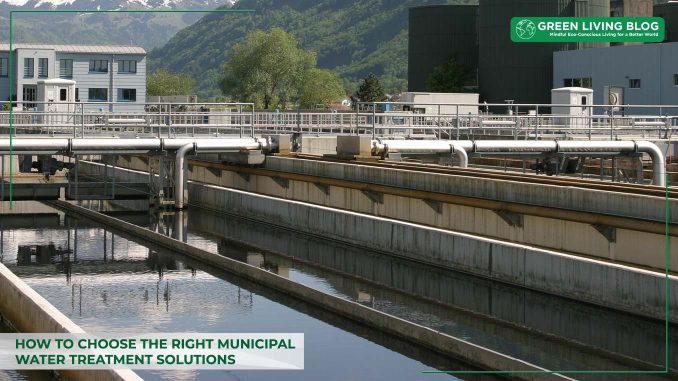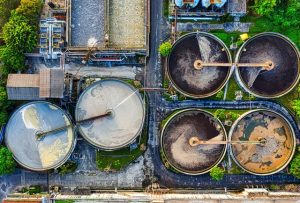
Clean water is essential for every community, and municipal water treatment plays a big role in making sure people have safe drinking water. With so many treatment options available, it can be challenging to know which solution is the best fit for a community’s needs.
This article will break down the important factors to think about when choosing the right water treatment system for municipalities.
Understanding the Water Needs of Your Community

The first step in picking the right water treatment solution is understanding the specific needs of the area. Water quality can vary greatly depending on where the water comes from, the local environment, and the size of the population. For example, towns near factories may need systems that can remove chemicals, while more rural areas may focus on removing natural contaminants like dirt or bacteria.
Regular water testing is key. What types of contaminants are in the water? Do the levels change during different seasons? Understanding these factors helps decision-makers choose the right treatment methods. Testing the water at different times of the year provides a complete view, helping communities find the best solution.
Common Water Treatment Methods
Once you know the water needs, the next step is selecting the right municipal water treatment solutions. There are a few common ways to treat water in municipalities:
- Filtration: This process uses filters to trap unwanted particles like dirt, sand, and even some chemicals. It’s one of the most basic and effective ways to clean water.
- Chlorination: Chlorine is added to the water to kill harmful germs like bacteria and viruses. It’s a common method for disinfecting water, but it doesn’t get rid of chemicals or metals.
- Ultraviolet (UV) Light: UV light is used to kill germs. It’s very effective but doesn’t remove other contaminants like chemicals or metals.
- Reverse Osmosis (RO): This system forces water through a special membrane to remove salts, chemicals, and bacteria. It’s highly effective but uses a lot of energy and creates wastewater.
- Ion Exchange: This process swaps harmful substances like lead for safer ones, like sodium. It’s commonly used to soften water or remove dangerous metals.
The best technology depends on the specific problems in the water. For example, if the water is hard, an ion exchange system may be the best choice to stop mineral buildup in pipes and appliances.
Considering Long-Term Costs

Cost is always a big factor when choosing a water treatment system. But it’s important to look beyond just the initial price. Maintenance and operation costs over time can add up. Some systems need regular filter changes or frequent repairs, which can increase expenses.
For example, UV disinfection systems may have a lower upfront cost but need regular monitoring and maintenance to keep the UV lights working correctly. Reverse osmosis systems, on the other hand, are very effective but can lead to higher energy bills and produce wastewater that needs to be handled.
It’s also smart to think about future needs. Will the system be able to handle a growing population? A solution that works well now may not be the best option in a few years if the community expands, and upgrading systems can be costly.
Environmental Considerations
Today, there is growing concern about how water treatment impacts the environment. Some methods, like reverse osmosis, produce a lot of wastewaters, which can be a problem in areas facing water shortages.
On the other hand, eco-friendly options like UV disinfection or natural filtration processes tend to have a smaller environmental impact. UV systems, for example, don’t produce harmful byproducts, and natural filters use less energy overall.
Municipalities should think about their environmental goals when choosing a water treatment system. More sustainable options may not only be better for the environment but could also save money in the long run.
Meeting Regulatory Standards

Every municipality must follow national and local laws that set standards for water quality. Choosing a system that meets these regulations is critical. If a water treatment solution doesn’t meet these standards, the community could face fines, legal issues, or health risks.
It’s also important to stay up to date with changes in these regulations. Water quality rules can become stricter over time, and communities need systems that can be adjusted or upgraded as needed.
Regular Monitoring and Maintenance
No matter how good a water treatment system is, it will only continue to work well if it’s properly monitored and maintained. This means making sure there are skilled workers to regularly test the water and check the equipment.
For instance, filters in filtration systems need to be replaced regularly, and UV lamps should be checked to ensure they are still effective. Without proper care, even the best systems can fail, leading to potential contamination.
Automated monitoring systems can help by providing real-time updates on water quality and the system’s performance. These systems can alert operators to any problems before they become serious, helping keep the water clean and safe.
Conclusion
Choosing the right municipal water treatment solution requires careful thought about many factors, including water quality, long-term costs, and environmental impact. By understanding the unique needs of their community and selecting the right technology, municipalities can ensure they provide safe drinking water for everyone.
It’s also important to keep systems maintained and stay up to date with regulations to avoid any issues. With the right approach, communities can invest in water treatment solutions that not only meet today’s needs but will continue to serve the population in the future.
![]()
Author Profile

- Eco Warrior by day, Eco Blogger by night trying to get the eco balance right.
Latest entries
 Green Home GuidesApril 17, 2025How Heat Pumps Help Cut Household Carbon Emissions
Green Home GuidesApril 17, 2025How Heat Pumps Help Cut Household Carbon Emissions EnvironmentApril 17, 20256 Benefits of Wall Cladding for Eco-Friendly Renovations
EnvironmentApril 17, 20256 Benefits of Wall Cladding for Eco-Friendly Renovations EnvironmentMarch 31, 20255 Sustainable Materials for Building Your Dream Eco-Friendly Pergola
EnvironmentMarch 31, 20255 Sustainable Materials for Building Your Dream Eco-Friendly Pergola Best practicesMarch 25, 202510 Green Tips to Live a More Sustainable Lifestyle
Best practicesMarch 25, 202510 Green Tips to Live a More Sustainable Lifestyle





Leave a Reply
You must be logged in to post a comment.